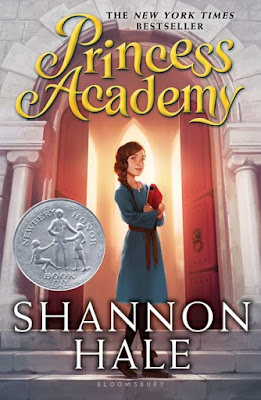Review: Princess Academy
Princess Academy by Shannon Hale is the first Newbery Award-winning princess book I've read since Ella Enchanted by Gail Carson Levine. To me, it felt like the book was trying a little too hard to become a modern classic, even though it obviously succeeded. It's not quite what you would expect from a princess book, as it is not a fairy tale adaptation and doesn't contain any familiar characters. For the first few chapters, it seems to take place in a completely non-magical world. I didn't enjoy the beginning of the book very much, but it grew on me as I went along. Though it is not one of my favorite princess books, I can understand how it won so many awards. If I had to compare it to something I've read in the past, it's most similar to Matilda by Roald Dahl.
Princess Academy tells the story of Miri, a simple mountain girl whose village gets selected by the king's priests for the prince to find his future bride. Per Danlandian tradition, all girls in the mountain territory who are of age must attend an academy to learn how to become proper princesses so they will be prepared when the prince makes his selection. Though this sounds like the perfect set-up for a modern-day reality TV show where girls are jealous and catty, that turns out not to be the case at all. Mount Eskel girls are hard workers who are fiercely loyal to their homeland and all who reside there. This works out in their favor when they learn that they must study under a strict headmistress named Olana who prides herself on disciplinary tactics such as beating girls on their wrists for speaking out of turn and locking them in closets for misbehaving. By banding together instead of competing with each other, Miri and her companions manage to overcome Olana's abuse.
The book is a deconstruction of the fairy tale narrative by breaking down stereotypes and modernizing them to apply to the real world. Most of the girls at the academy have little interest in winning the prince's heart because they don't know enough about him to want to marry him. Miri has a realistic perspective on the thought of being a princess. She thinks it's fun to fantasize about, but remains unsure whether or not it would truly bring her happiness. The requirements to become the Academy Princess, which is similar to a valedictorian, do not involve winning Prince Steffan's affections, but instead being the hardest worker in the school. Thanks to the academy, the mountain girls have an opportunity to learn reading, history, and arithmetic, an opportunity that they would not have been granted otherwise due to residing in such a small territory. Miri takes her studies very seriously in spite of her dislike of Olana's methods. She quickly transforms into an avid reader and uses her knowledge to try to improve the lives of her family and others who live on the mountain.
The fantasy aspect of the book comes into play gradually and is taken for granted by most of the residents on Mount Eskel. The quarry workers use a telepathy-like ability called "quarry speech" to hear each other over the loud noises they make during their labor. Until Miri discovers that it could be used outside of the quarry, no one on the mountain had thought of it as supernatural. While she continues to pursue her studies, Miri also strengthens her ability to use quarry speech by performing tests to determine how she can use it to the fullest potential. The skill requires her to make up songs in her mind. As a result, each chapter of the book begins with a song verse that serves as a metaphor for what happens in that chapter. The quarry speech adds a supernatural element to the story, but not quite enough to make it feel like a true fairy tale.
Princess Academy is a great novel for younger girls to understand the values of education, teamwork, and loyalty, but does not have much to offer to fairy tale fans in general, It did not feel like a traditional princess story as much as it did a modern classic that promotes contemporary values. While there is certainly nothing wrong with that, the book did not move me emotionally in the same way as the romance and adventure from other princess books I've read in the past did. I would recommend this book for young girls who want to read about a character they can relate to who is attending school. For fairy tale fans, it can be a hit or miss. If you enjoy this book, it is the first in a trilogy with two sequels. I have also published a book of poetry that is similar to Miri's quarry speech called Castle [and other poems about growing up in a fairy tale world], which is available in Kindle and paperback formats on Amazon.
Princess Academy tells the story of Miri, a simple mountain girl whose village gets selected by the king's priests for the prince to find his future bride. Per Danlandian tradition, all girls in the mountain territory who are of age must attend an academy to learn how to become proper princesses so they will be prepared when the prince makes his selection. Though this sounds like the perfect set-up for a modern-day reality TV show where girls are jealous and catty, that turns out not to be the case at all. Mount Eskel girls are hard workers who are fiercely loyal to their homeland and all who reside there. This works out in their favor when they learn that they must study under a strict headmistress named Olana who prides herself on disciplinary tactics such as beating girls on their wrists for speaking out of turn and locking them in closets for misbehaving. By banding together instead of competing with each other, Miri and her companions manage to overcome Olana's abuse.
The book is a deconstruction of the fairy tale narrative by breaking down stereotypes and modernizing them to apply to the real world. Most of the girls at the academy have little interest in winning the prince's heart because they don't know enough about him to want to marry him. Miri has a realistic perspective on the thought of being a princess. She thinks it's fun to fantasize about, but remains unsure whether or not it would truly bring her happiness. The requirements to become the Academy Princess, which is similar to a valedictorian, do not involve winning Prince Steffan's affections, but instead being the hardest worker in the school. Thanks to the academy, the mountain girls have an opportunity to learn reading, history, and arithmetic, an opportunity that they would not have been granted otherwise due to residing in such a small territory. Miri takes her studies very seriously in spite of her dislike of Olana's methods. She quickly transforms into an avid reader and uses her knowledge to try to improve the lives of her family and others who live on the mountain.
The fantasy aspect of the book comes into play gradually and is taken for granted by most of the residents on Mount Eskel. The quarry workers use a telepathy-like ability called "quarry speech" to hear each other over the loud noises they make during their labor. Until Miri discovers that it could be used outside of the quarry, no one on the mountain had thought of it as supernatural. While she continues to pursue her studies, Miri also strengthens her ability to use quarry speech by performing tests to determine how she can use it to the fullest potential. The skill requires her to make up songs in her mind. As a result, each chapter of the book begins with a song verse that serves as a metaphor for what happens in that chapter. The quarry speech adds a supernatural element to the story, but not quite enough to make it feel like a true fairy tale.
Princess Academy is a great novel for younger girls to understand the values of education, teamwork, and loyalty, but does not have much to offer to fairy tale fans in general, It did not feel like a traditional princess story as much as it did a modern classic that promotes contemporary values. While there is certainly nothing wrong with that, the book did not move me emotionally in the same way as the romance and adventure from other princess books I've read in the past did. I would recommend this book for young girls who want to read about a character they can relate to who is attending school. For fairy tale fans, it can be a hit or miss. If you enjoy this book, it is the first in a trilogy with two sequels. I have also published a book of poetry that is similar to Miri's quarry speech called Castle [and other poems about growing up in a fairy tale world], which is available in Kindle and paperback formats on Amazon.












Comments